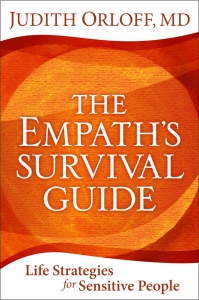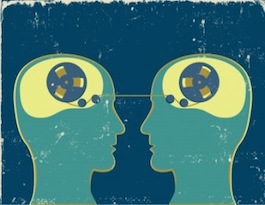Are you an empath? To learn coping skills, get my PDF “Life Strategies for Sensitive People” here.

Empathy is when we reach our hearts out to others and put ourselves in their shoes. However, being an empath goes even farther. Like many of my patients and myself, empaths are people who’re high on the empathic spectrum and actually feel what is happening in others in their own bodies. As a result, empaths can have incredible compassion for people–but they often get exhausted from feeling “too much” unless they develop strategies to safeguard their sensitivities and develop healthy boundaries.
In my book, “The Empath’s Survival Guide” I discuss the following intriguing scientific explanations of empathy and empaths. These will help us more deeply understand the power of empathy so we can utilize and honor it in our lives.
5 Scientific Explanations of Empathy and Empaths
1. The Mirror Neuron System
Researchers have discovered a specialized group of brain cells that are responsible for compassion. These cells enable everyone to mirror emotions, to share another person’s pain, fear, or joy. Because empaths are thought to have hyper-responsive mirror neurons, we deeply resonate with other people’s feelings. How does this occur? Mirror neurons are triggered by outside events. For example, our spouse gets hurt, we feel hurt too. Our child is crying; we feel sad too. Our friend is happy; we feel happy too. In contrast, psychopaths, sociopaths, and narcissists are thought to have what science calls “empathy deficient disorders.” This means they lack the ability to feel empathy like other people do, which may be caused by an under-active mirror neuron system. We must beware of these people because they are incapable of unconditional love.
2. Electromagnetic Fields
The second finding is based on the fact that both the brain and the heart generate electromagnetic fields. According to the HeartMath Institute, these fields transmit information about people’s thoughts and emotions. Empaths may be particularly sensitive to this input and tend to become overwhelmed by it. Similarly, we often have stronger physical and emotional responses to changes in the electromagnetic fields of the earth and sun. Empaths know well that what happens to the earth and sun affects our state of mind and energy. Similarly, we often have stronger physical and emotional responses to changes in the electromagnetic fields of the earth and sun. Empaths know well that what happens to the earth and sun affects our state of mind and energy.
3. Emotional Contagion
The third finding which enhances our understanding of empaths is the phenomena of emotional contagion. Research has shown that many people pick up the emotions of those around them. For instance, one crying infant will set off a wave of crying in a hospital ward. Or one person loudly expressing anxiety in the workplace can spread it to other workers. People commonly catch other people’s feelings in groups. A recent New York Times article stated that this ability to synchronize moods with others is crucial for good relationships. What is the lesson for empaths? To choose positive people in our lives so we’re not brought down by negativity. Or, if, say a friend is going through a hard time, take special precautions to ground and center yourself. These are important strategies you’ll learn in this book.
4. Increased Dopamine Sensitivity
The fourth finding involves dopamine, a neurotransmitter that increases the activity of neurons and is associated with the pleasure response. Research has shown that introverted empaths tend to have a higher sensitivity to dopamine than extroverts. Basically, they need less dopamine to feel happy. That could explain why they are more content with alone time, reading, and meditation and need less external stimulation from parties and other large social gatherings. In contrast, extroverts crave the dopamine rush from lively events. In fact, they can’t get enough of it.
5. Synesthesia
The fifth finding, which I find particularly compelling, is the extraordinary state called “mirror-touch synesthesia.” Synesthesia is a neurological condition in which two different senses are paired in the brain. For instance, you see colors when you hear a piece of music or you taste words. Famous synesthetics include Isaac Newton, Billy Joel, and violinist Itzhak Perlman. However, with mirror-touch synesthesia, people can actually feel the emotions and sensations of others in their own bodies as if these were their own. This is a wonderful neurological explanation of an empath’s experience.
The Dali Lama says, “Empathy is the most precious human quality.” During these stressful times, it’s easy to get overwhelmed. Even so, empathy is the quality that will get us through. It will enable us to respect one another, even if we disagree. Empathy doesn’t make you a sentimental softy without discernment. It allows you to keep your heart open to foster tolerance and understanding. It might not always be effective in getting through to people and creating peace but I think it’s the best chance we have.
(Adapted from “The Empath’s Survival Guide: Life Strategies for Sensitive People“ by Judith Orloff, MD, which is a guidebook for empaths and all caring people who want to keep their hearts open in an often-insensitive world.)




“The Empath’s Survival Guide” Is the first of Judith’s books that I read. That book, “Second Sight” and “Thriving as an Empath” have been such wonderful resources for me. I have always known that I was empathetic to others feelings. One of my best qualities even as a young child was being able to “put myself in others shoes”. I am also highly sensitive. I am in my mid-fifties now. I am just now understanding more fully that there aren’t a lot of people who feel as deeply as I and other Empaths do. That knowledge has helped me to worry less about whether I’ve hurt people’s feelings. The strategies in Judith’s book have helped me to shield myself from toxic personalities and to walk away (politely, of course) when I need to get away from a non-stop talker or other “energy vampire”.
It’s not easy being so sensitive, but I am learning better how to take care of my own sensitivities and appreciate their positive aspects.
I am so grateful to you,Judith, for sharing your wisdom and personal experiences with us through your writing!! You have truly enhanced my life, and I enjoy helping others and recommending your books to other sensitives and Empaths that I encounter in my life.
I have, since I was very young, been able to pick up on things most didn’t. I also pick up on the emotions of others as if they were mine, and I can tell a lie real fast. I don’t like crowds or even movies with violent content. Sometimes being an empath is hard, but many blessings for others have come about, and for this I’m thankful!
I’ve been what I first called my self a sensitive as well being intuitive. I could feel not only others emotions & thoughts but their pain. It’s been a difficult existence got me. In 1971 I had my powers tested on & ongoing basis in NYC by Dr Karlis Oasis & Dr Janet Mitchell at the American Society for Physical Research. I be learned much later in life that when feeling others pain not to absorb it. I am so sensitive to so many things & peoples negative emotions are severely toxic to me. I have done psychic healing since childhood & Reiki since 1996. For 5 years after appearing on various radio stations & TV shows I had my own live weekly hour public access TV show. What I could never understand is the jealousy & animosity towards me because of my gifts which are not always pleasant experiencing.
After over 50 years my sensitivity has increased & I moved to the country, gave up much to be living alone & embracing nature & my family of intuitive talking parrots.
Great article.
Didn t discover until 2 years ago that I was an empath. I was very enlightened and finally discovered a great deal about myself. I find it very painful to be an empath.